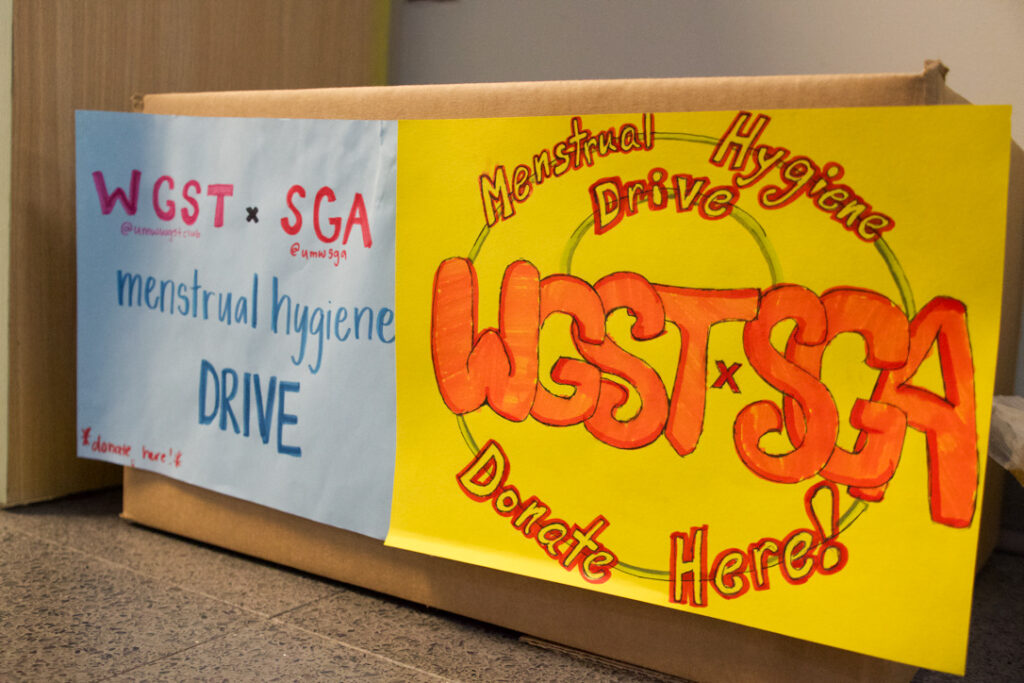UMW clubs collaborate with local Fredericksburg shelter Empowerhouse for Women’s History Month donation drive
4 min read
The donation boxes including menstrual hygienes are located in various buildings on campus. | Abbey Magnet, The Weekly Ringer
by KRISTEN HOWARD
Staff Writer
In honor of Women’s History Month, the UMW chapter of NAACP, Women of Color and the Latino Student Association have collaborated with Empowerhouse and the UMW Women’s Gender and Sexuality Studies Student Association to create a donation drive through which they will collect items for women in need both on campus and in the Fredericksburg area.
Donation boxes for the drive are located in various buildings around campus, such as the James Farmer Multicultural Center, the Honors Commons in Lee Hall, Combs Hall and Katora Café. They will be open for donations until the end of the month.
The donation drive is the product of a collaboration with various student clubs, organizations and associations alongside Empowerhouse, a local shelter centered around supporting and helping victims of domestic violence.
According to the Empowerhouse website, their mission is to empower “survivors and their children to believe in themselves and build new lives filled with dignity, respect, safety, and hope.” Additionally, their vision is to create “a diverse network of community members working together to promote safe relationships, homes, and communities.”
In anticipation of the drive, Empowerhouse provided the clubs with a list of items they needed and what was best to be donated. The list included cleaning supplies, non-perishable foods, menstrual products, adult clothing, children’s clothes, gift cards and used cell phones.
Nahjah Wilson, a junior political science major and president of UMW NAACP explained the purpose of donating products on the list from Empowerhouse.
“We also are trying to get more warm things that could help women who were in domestic violence situations,” she said. “So that would include getting them different gift cards so they can start buying stuff for themselves.”
The Empowerhouse website, as well as a QR code posted on the boxes themselves, offer a list of donations that would best support their cause.
Paula Perez, a junior psychology major and the president of Women of Color, believes that this drive is significant not only to Empowerhouse but to UMW as well.
“This event was originally just supposed to support Empowerhouse, which is a very local women’s drive, but they provide for women and also children, families and single moms all the supplies they need,” she said. “But it expanded to the community on campus with the help of women and gender studies.”
According to Perez, the menstrual products that get donated will be divided between Empowerhouse and UMW Women’s Gender and Sexuality Studies Student Association so that those around the city and on campus have access to these goods.
“Whatever we get from the donations when it comes to menstrual products, half of that will be split into Empowerhouse, but also bring back to the community,” said Perez. “So there’s products in the women’s bathroom or family bathrooms, just so it’s there in case someone needs it.”
Junior political science major Kaylah Lightfoot realized long before the drive began that she wanted to “meet the needs of women more especially when it comes to feminine hygiene products.”
Ensuring that menstrual products are available, in addition to considering the variations of products needed, plays an important role in this drive. Regarding donated menstrual products, Lightfoot considered the current offerings in the bathrooms around the university.
“Feminine hygiene products were always important when it comes to tampons and pads, but there’s also the idea of sizing of pads,” she said. “We understand that women need all the different variations and sizes [of] both tampons and pads. The big issue was that the school only gave us liners.”
While NAACP, WOC and LSA are the main three clubs working on the women’s drive, the Gwen Hale Resource Center assisted with research and donations, and SGA also contributed to the drive.
According to Perez, working with the clubs required a massive collaborative effort that came with some difficulties, but they were able to rely on each other to bring the drive to fruition.
“We have to be on top of it, or if not, we might forget something,” she said. “But I will say, so far it’s been really nice working with NAACP and LSA because even if we mess up or we forget one thing, they’re able to be like ‘oh no, don’t worry about it. I got you, you got this. I got you covered.’”
During the planning process, Perez found a greater sense of community through working with like-minded and passionate individuals.
“Something I fully, really realize is that we all kind of go through the same thing,” she said. “You’re not the only one and you’re very much united in a sense.”
She continued. “I think it’s just seeing how close connected the community is—I can see it firsthand.”
Lightfoot echoed similar sentiments about the collaboration.
“Because I’ve been part of different planning committees where it’s just like ‘oh, everybody’s names on there’ but the work isn’t equal amongst everybody,” she said. “So being part of this was just like ‘oh, the work is actually equal and we’re still able to manage other bits of our own vision as well.’”











